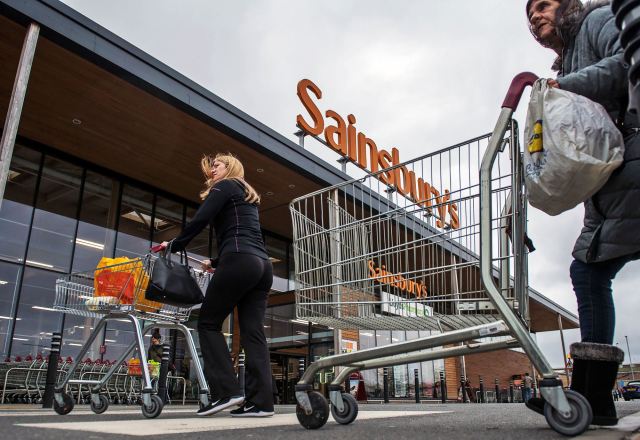“We’re in the money, the sky is sunny,” sang the head of Sainsbury’s as he waited to be interviewed about his supermarket chain’s proposed merger with ASDA. Mike Coupe, mortified I’m sure, has apologised for his “unguarded moment”, but catchy or not, his choice of song is telling.
Watch Sainsbury's CEO sing "we're in the money" while waiting to talk about the £12 billion merger with Asda – he's since apologised for his "unguarded moment" https://t.co/Kuaowz0q1u pic.twitter.com/jYMngcahS2
— ITV News (@itvnews) April 30, 2018
Coupe certainly is in the money. The planned £12 billion merger between Sainsbury’s and Asda would place the him at the head of a retail behemoth, their combined market share of 31% catapulting them past Tesco’s 27%. Reflecting an expectation of big profits, Sainsbury’s share price closed 15% up after the announcement, giving Coupe’s own shareholdings a nice £600,000 boost.
Good news for shareholders then. But what about consumers? Sainsbury’s and Asda have promised cheaper goods – a 10% cut to the price of everyday items – which is encouraging news for families struggling with low wages but a rising cost of living. The merger also ups the ante for the other big players, such as Tesco, Morrisons and Waitrose who are already in stiff competition with relative newcomers Aldi and Lidl, discount chains from Germany.
That sounds good for consumers too, then – cheaper goods driven by another episode of supermarket price wars. But while, in the short-term, that’s money in our pockets, in the longer-term it’s a narrowing of consumer choice. And a narrowing of choice reflects less competition, or, to put it another way, a more captive market; producers are able to take advantage of consumers unable to take their business elsewhere. That’s not how free markets should work.
Scott Corfe, Chief Economist at the Westminster-based think tank the Social Market Foundation, and an expert on market concentration, is unequivocal. The proposed merger, “risks undermining competition”, he told me. Citing emerging evidence from the US, he advises policymakers to be cautious: “Mergers in concentrated consumer markets risk undermining investment and innovation in the economy, as well as leading to higher levels of inequality.” For sustainably low prices producers need to be in constant competition, racing to develop the best products and offers to entice people to their brand. Increased market concentration undermines that.
It’s a point Elizabeth Warren, outspoken consumer protection advocate and Democrat Senator from Massachusetts, has made repeatedly about the oligopolistic consumer markets in America. In an interview with The Nation earlier this year she described the effect of a few big players controlling an entire industry as “devastating for both the economy and political system”. The solution? “Block anticompetitive mergers; stop anticompetitive conduct; and prioritise protecting competition.”
You might expect Warren, doyenne of the American Left, to be critical of market economics. But the truth is quite the opposite. Warren used to vote Republican because of what she saw as their “principled…conservative approach to economics and to markets”. She broke ties with the GOP when she felt it had moved away from free markets towards crony capitalism: politicians in hoc with big business, whose vast wealth and lobbying prowess enable them to tilt the scales in their favour.
This is what risks happening with supermarkets here. If Sainsbury’s combined with Asda, that would leave almost 60% of the entire market in the hands of a “Big Two” – them and Tesco. Then who benefits? The more concentrated markets are allowed to get, the more they serve the producer at the expense of the consumer. The bigger the businesses dominating markets, the harder it is for new entrants to break through. And the weaker the political and regulatory response, the more daring the corporate behaviour. Just look at the consumer problems which bedevil other concentrated retail markets, such as energy and banking.
Just as the Republicans in America look to be on the side of big business and the wealthy executives running those corporations, the Conservative party in Britain risks the same fate. Being pro-free markets is not the same as being pro-big business, in fact sitting on the side lines as consumer choice decreases is what is undermining people’s faith in capitalism.
Competition is key to prosperity. Scott Corfe told me that denying the supermarket merger could be the best option, it would “force Sainsbury’s and Asda to try harder – innovating, rather than merging, their way out of their current trouble”. That way, we might all be in the money, not just Mike Coupe and his fellow executives and shareholders.









Join the discussion
Join like minded readers that support our journalism by becoming a paid subscriber
To join the discussion in the comments, become a paid subscriber.
Join like minded readers that support our journalism, read unlimited articles and enjoy other subscriber-only benefits.
Subscribe